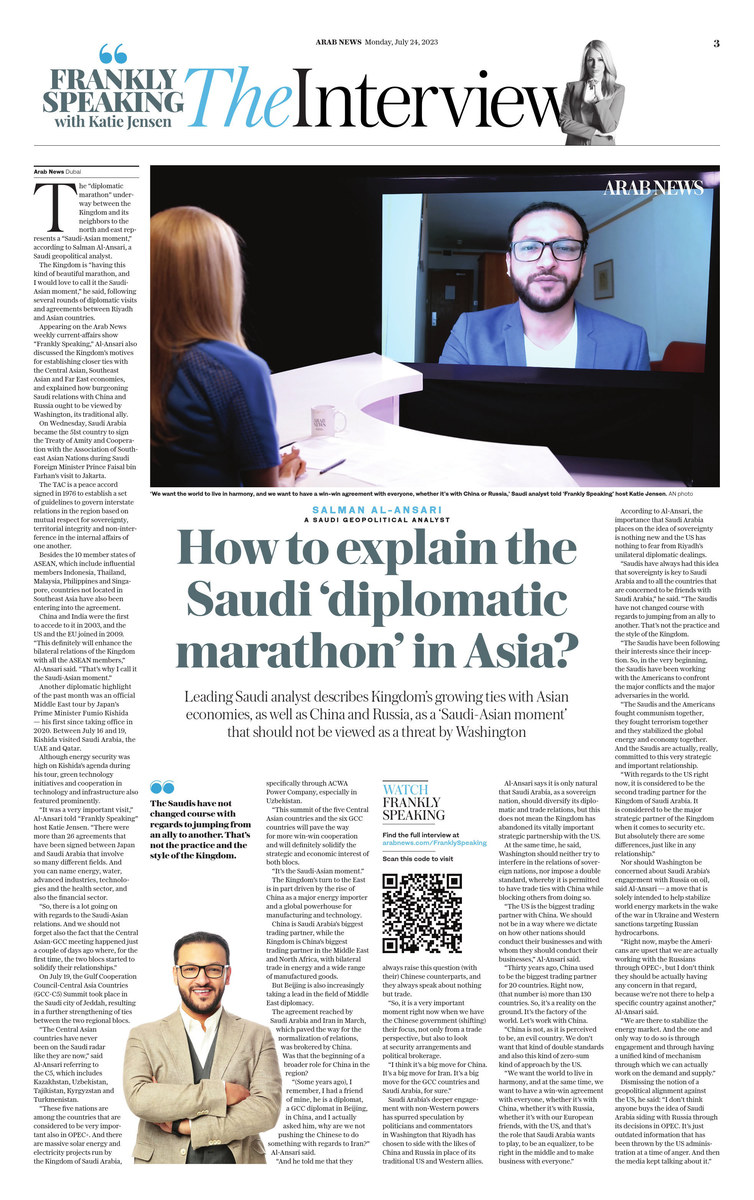DUBAI: The “diplomatic marathon” underway between the Kingdom and its neighbors to the north and east represents a “Saudi-Asian moment,” according to Salman Al-Ansari, a Saudi geopolitical analyst.
The Kingdom is “having this kind of beautiful marathon, and I would love to call it the Saudi-Asian moment,” he said, following several rounds of diplomatic visits and agreements between Riyadh and Asian countries.
Appearing on the Arab News weekly current-affairs show “Frankly Speaking,” Al-Ansari also discussed the Kingdom’s motives for establishing closer ties with the Central Asian, Southeast Asian and Far East economies, and explained how burgeoning Saudi relations with China and Russia ought to be viewed by Washington, its traditional ally.
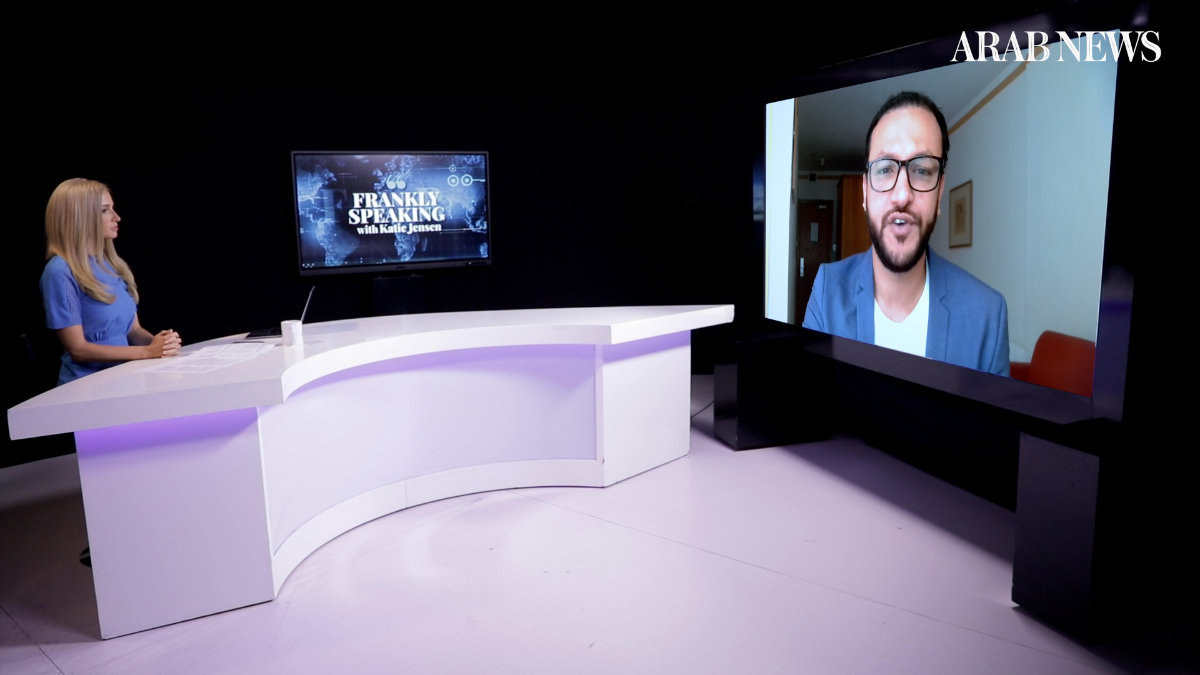
Salman Al-Ansari, a Saudi geopolitical analyst, speaks to Frankly Speaking host Katie Jensen. (AN photo)
On Wednesday, Saudi Arabia became the 51st country to sign the Treaty of Amity and Cooperation with the Association of Southeast Asian Nations during Saudi Foreign Minister Prince Faisal bin Farhan’s visit to Jakarta.
The TAC is a peace accord signed in 1976 to establish a set of guidelines to govern inter-state relations in the region based on mutual respect for sovereignty, territorial integrity and non-interference in the internal affairs of one another.
Besides the 10 member states of ASEAN, which include influential members Indonesia, Thailand, Malaysia, Philippines and Singapore, countries not located in Southeast Asia have also been entering into the agreement.
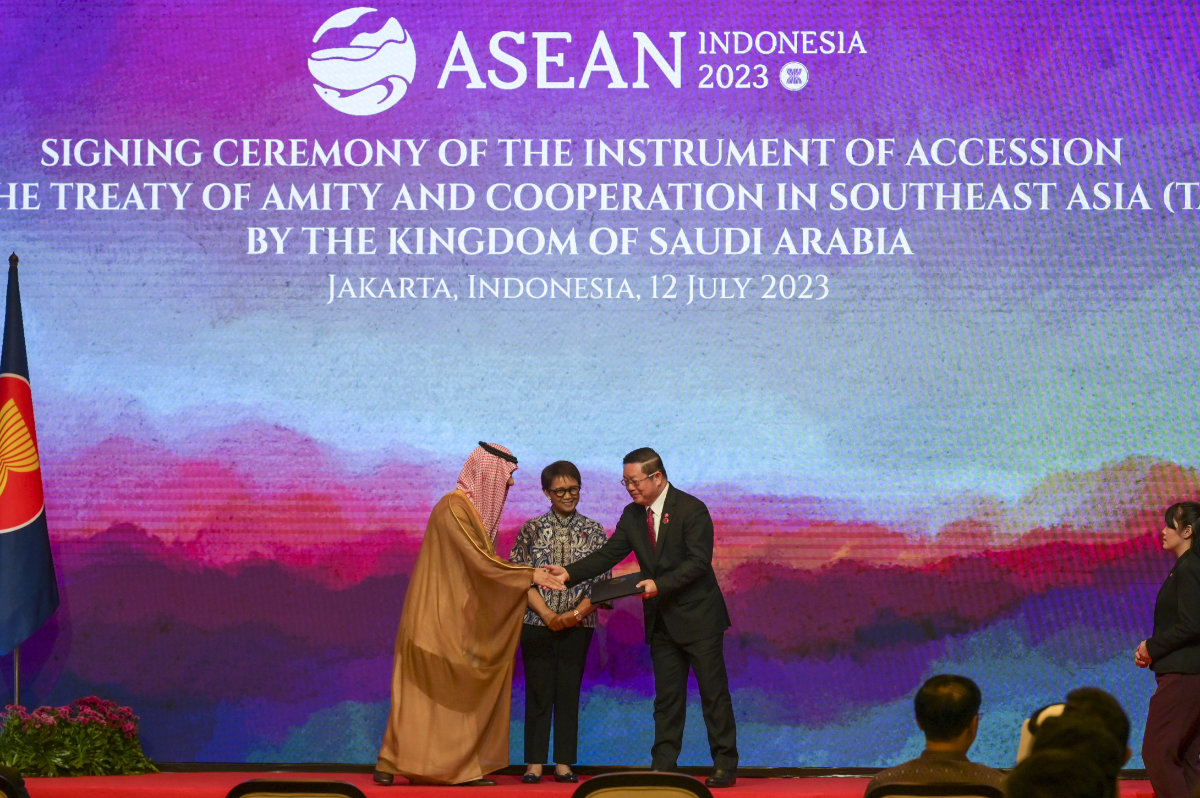
Saudi Arabia's Foreign Minister Faisal bin Farhan (L), Indonesia's Foreign Minister Retno Marsudi (R), and ASEAN Secretary-General Kao Kim Hourn at the signing ceremony of Saudi Arabia's accession to the Treaty of Amity and Cooperation in Southeast Asia (TAC) in Jakarta on July 12, 2023. (AFP)
China and India were the first to accede to it in 2003, and the US and the EU joined in 2009. “This definitely will enhance the bilateral relations of the Kingdom with all the ASEAN members,” Al-Ansari said. “That’s why I call it the Saudi-Asian moment.”
Another diplomatic highlight of the past month was an official Middle East tour by Japan’s Prime Minister Fumio Kishida — his first since taking office in 2020. Between July 16 and 19, Kishida visited Saudi Arabia, the UAE and Qatar.
Although energy security was high on Kishida’s agenda during his tour, green technology initiatives and cooperation in technology and infrastructure also featured prominently.
“It was a very important visit,” Al-Ansari told “Frankly Speaking” host Katie Jensen. “There were more than 26 agreements that have been signed between Japan and Saudi Arabia that involve so many different fields. And you can name energy, water, advanced industries, technologies and the health sector, and also the financial sector.
“So, there is a lot going on with regards to the Saudi-Asian relations. And we should not forget also the fact that the Central Asian-GCC meeting happened just a couple of days ago where, for the first time, the two blocs started to solidify their relationships.”
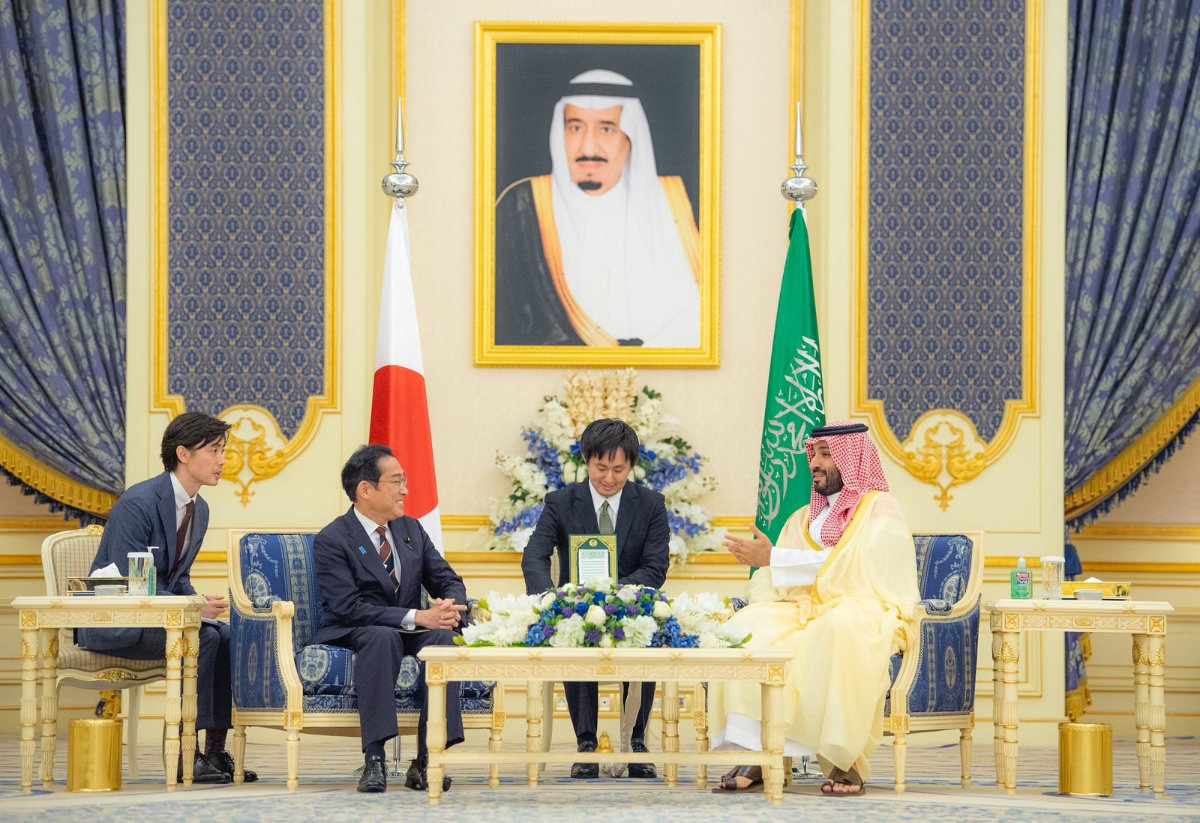
Saudi Arabia’s Crown Prince Mohammed bin Salman (R) meets with Japan’s Prime Minister Fumio Kishida (2nd left) at Al-Salam Palace in Jeddah on July 16, 2023. (SPA)
On July 19, the Gulf Cooperation Council-Central Asia Countries (GCC-C5) Summit took place in the Saudi city of Jeddah, resulting in a further strengthening of ties between the two regional blocs.
“The Central Asian countries have never been on the Saudi radar like they are now,” said Al-Ansari referring to the C5, which includes Kazakhstan, Uzbekistan, Tajikistan, Kyrgyzstan and Turkmenistan.
“These five nations are among the countries that are considered to be very important also in OPEC+. And there are massive solar energy and electricity projects run by the Kingdom of Saudi Arabia, specifically through ACWA Power Company, especially in Uzbekistan.
“This summit of the five Central Asian countries and the six GCC countries will pave the way for more win-win cooperation and will definitely solidify the strategic and economic interest of both blocs.
“It’s the Saudi-Asian moment.”
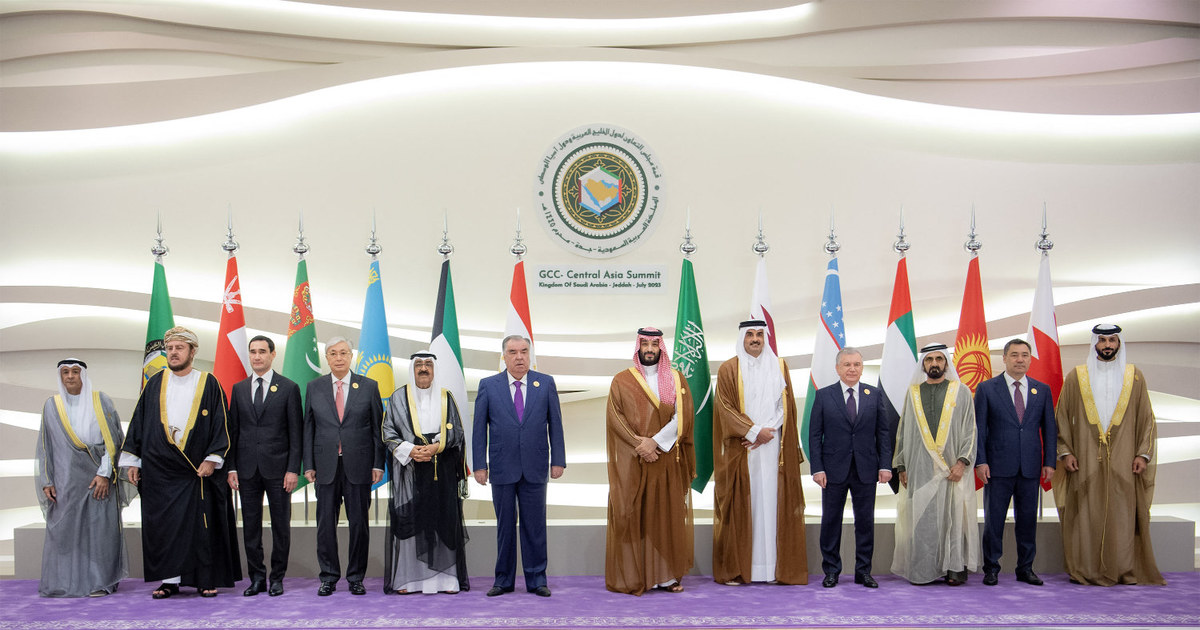
Family photo of leaders of Saudi Arabia, Bahrain, Kuwait, Oman, Qatar, the UAE, Kazakhstan, Tajikistan, Uzbekistan, Kyrgyzstan and Turkmenistan during the Gulf Cooperation Council-Central Asia Countries (GCC-C5) Summit in Jeddah on July 19, 2023. (SPA)
The Kingdom’s turn to the East is in part driven by the rise of China as a major energy importer and a global powerhouse for manufacturing and technology.
China is Saudi Arabia’s biggest trading partner, while the Kingdom is China’s biggest trading partner in the Middle East and North Africa, with bilateral trade in energy and a wide range of manufactured goods.
But Beijing is also increasingly taking a lead in the field of Middle East diplomacy.
The agreement reached by Saudi Arabia and Iran in March, which paved the way for the normalization of relations, was brokered by China. Was that the beginning of a broader role for China in the region?
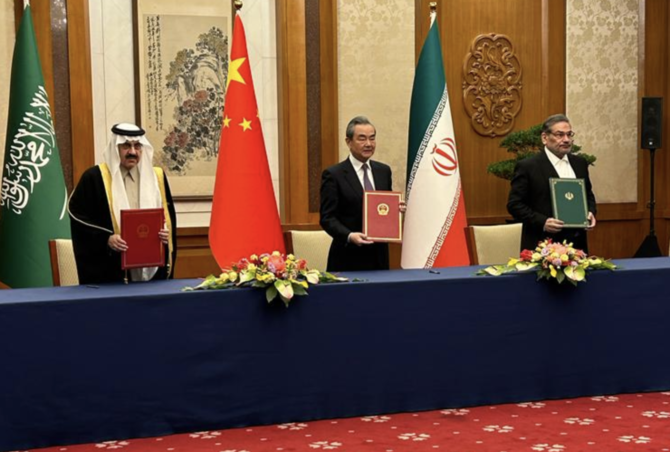
Iran’s top security official Ali Shamkhani (L) and Saudi Arabia’s national security adviser Musaad bin Mohammed Al-Aiban (R) show the document they signed in Beijing, which top China official Wang Yi (C) helped broker. (SPA file photo)
“(Some years ago), I remember, I had a friend of mine, he is a diplomat, a GCC diplomat in Beijing, in China, and I actually asked him, why are we not pushing the Chinese to do something with regards to Iran?” Al-Ansari said.
“And he told me that they always raise this question (with their) Chinese counterparts, and they always speak about nothing but trade.
“So, it is a very important moment right now when we have the Chinese government (shifting) their focus, not only from a trade perspective, but also to look at security arrangements and political brokerage.
“I think it’s a big move for China. It’s a big move for Iran. It’s a big move for the GCC countries and Saudi Arabia, for sure.”
Saudi Arabia’s deeper engagement with non-Western powers has spurred speculation by politicians and commentators in Washington that Riyadh has chosen to side with the likes of China and Russia in place of its traditional US and Western allies.
Al-Ansari says it is only natural that Saudi Arabia, as a sovereign nation, should diversify its diplomatic and trade relations, but this does not mean the Kingdom has abandoned its vitally important strategic partnership with the US.
At the same time, he said, Washington should neither try to interfere in the relations of sovereign nations, nor impose a double standard, whereby it is permitted to have trade ties with China while blocking others from doing so.
“The US is the biggest trading partner with China. We should not be in a way where we dictate on how other nations should conduct their businesses and with whom they should conduct their businesses,” Al-Ansari said.
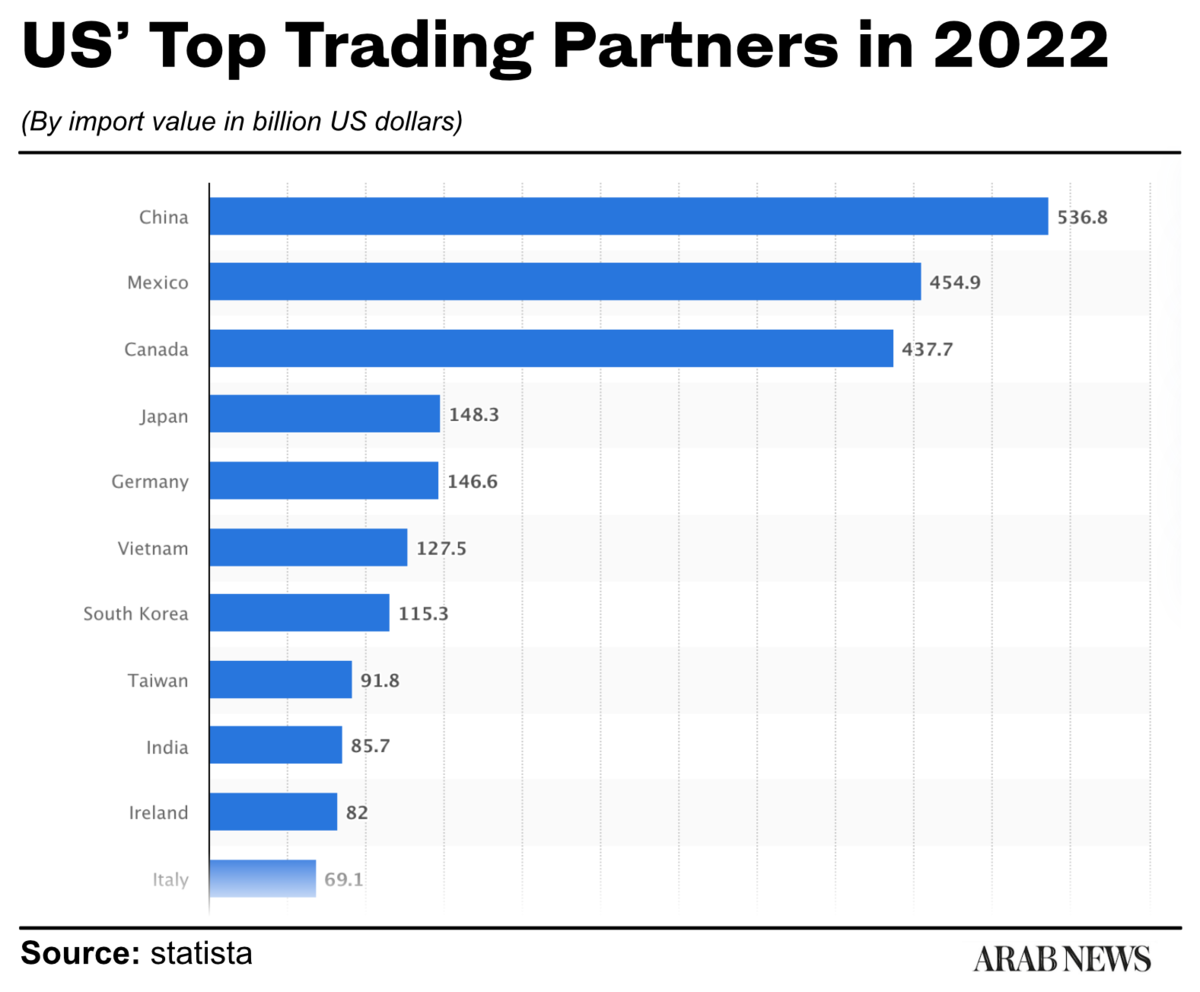
China is the biggest trading partner of the US and for Washington to hinder others from expanding trade with China would be tantamount to double standards, says Salman Al-Ansari. (AN infographic)
“Thirty years ago, China used to be the biggest trading partner for 20 countries. Right now, (that number is) more than 130 countries. So, it’s a reality on the ground. It’s the factory of the world. Let’s work with China.
“China is not, as it is perceived to be, an evil country. We don’t want that kind of double standards and also this kind of zero-sum kind of approach by the US.
“We want the world to live in harmony, and at the same time, we want to have a win-win agreement with everyone, whether it’s with China, whether it’s with Russia, whether it’s with our European friends, with the US, and that’s the role that Saudi Arabia wants to play, to be an equalizer, to be right in the middle and to make business with everyone.”
According to Al-Ansari, the importance that Saudi Arabia places on the idea of sovereignty is nothing new and the US has nothing to fear from Riyadh’s unilateral diplomatic dealings.
“Saudis have always had this idea that sovereignty is key to Saudi Arabia and to all the countries that are concerned to be friends with Saudi Arabia,” he said. “The Saudis have not changed course with regards to jumping from an ally to another. That’s not the practice and the style of the Kingdom.
The Saudis and the Americans fought communism together, they fought terrorism together and they stabilized the global energy and economy together. And the Saudis are actually, really, committed to this very strategic and important relationship.
Salman Al-Ansari
“The Saudis have been following their interests since their inception. So, in the very beginning, the Saudis have been working with the Americans to confront the major conflicts and the major adversaries in the world.
“The Saudis and the Americans fought communism together, they fought terrorism together and they stabilized the global energy and economy together. And the Saudis are actually, really, committed to this very strategic and important relationship.
“With regards to the US right now, it is considered to be the second trading partner for the Kingdom of Saudi Arabia. It is considered to be the major strategic partner of the Kingdom when it comes to security etc. But absolutely there are some differences, just like in any relationship.”
Nor should Washington be concerned about Saudi Arabia’s engagement with Russia on oil, said Al-Ansari — a move that is solely intended to help stabilize world energy markets in the wake of the war in Ukraine and Western sanctions targeting Russian hydrocarbons.
“Right now, maybe the Americans are upset that we are actually working with the Russians through OPEC+, but I don’t think they should be actually having any concern in that regard, because we’re not there to help a specific country against another,” Al-Ansari said.
“We are there to stabilize the energy market. And the one and only way to do so is through engagement and through having a unified kind of mechanism through which we can actually work on the demand and supply.”
Dismissing the notion of a geopolitical alignment against the US, he said: “I don’t think anyone buys the idea of Saudi Arabia siding with Russia through its decisions in OPEC. It’s just outdated information that has been thrown by the US administration at a time of anger. And then the media kept talking about it.”
